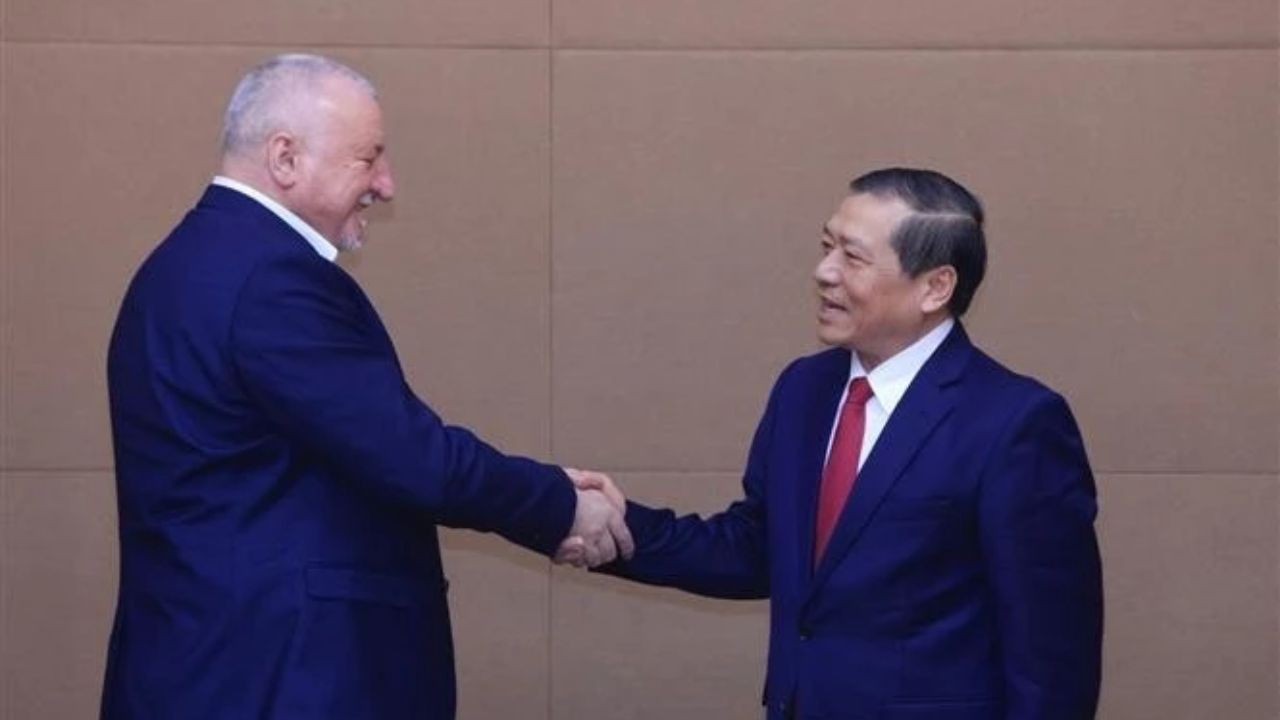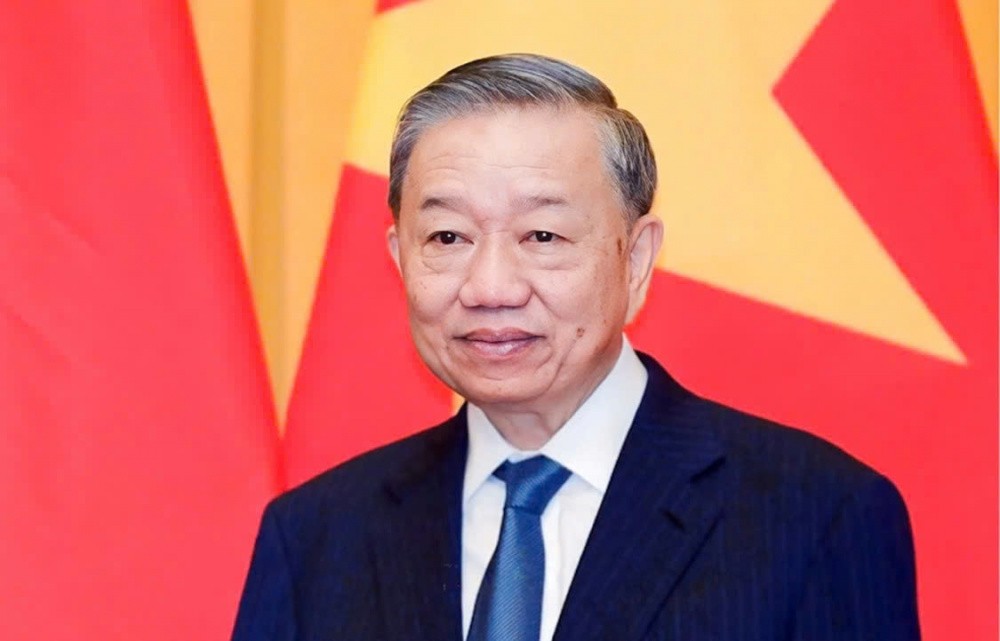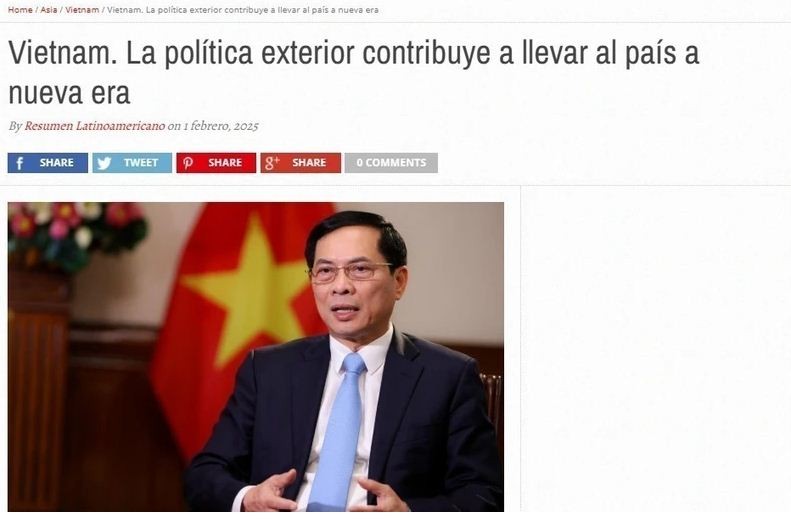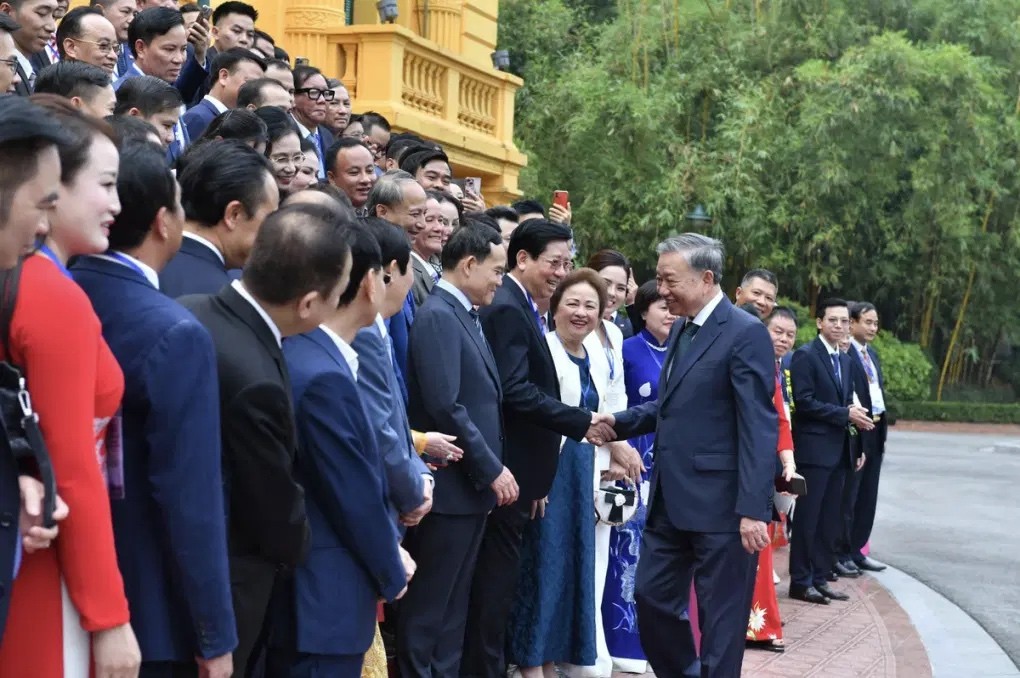Strengthening Party's Leadership to Safeguard National Security Amid International Integration (Part 2)
| Vietnam Supports Global Nuclear Safeguards | |
| "Safeguarding the Border like Protecting Home" |
Key solutions to strengthen party leadership in ensuring economic security and safeguarding national security
In the coming period, the international and domestic economic and political landscape is expected to remain complex and dynamic, with numerous potential sources of instability and a significant increase in both traditional and non-traditional security risks. Notably, Vietnam is undergoing a transformative phase in its growth model, restructuring the economy, and comprehensively refining its socialist-oriented market economy framework. This situation creates intertwined and complex issues, with heightened risks and challenges, especially in the economic sphere. These realities demand resolute measures to ensure economic security, effectively mitigate risks, and establish a favorable, safe, and healthy environment for socio-economic development, thereby enhancing national security strength. To achieve these objectives and implement Politburo Directive No. 12-CT/TW (12th tenure) and Directive No. 24-CT/TW (13th tenure) effectively, several key solutions must be pursued.
 |
| The People's Public Security Force plays a pivotal role in ensuring economic security. Photo: nhiepanhdoisong.vn |
First, enhancing the Party’s leadership in economic development is a fundamental condition for ensuring economic security in the new context.
Currently, the Party’s leadership in economic development and its efforts to ensure economic security still require further improvement. Certain Party organizations lack a comprehensive understanding of their roles and responsibilities in leading economic development and ensuring economic security within the context of a socialist-oriented market economy, international integration, and the Fourth Industrial Revolution. Some organizations cling to outdated mindsets and approaches, which are no longer suitable for addressing new and complex issues, leading to limited effectiveness in resolving emerging challenges.
To address these shortcomings, Party organizations must continuously enhance their capacity and expertise in leading economic development and ensuring economic security. Leadership methods should be renewed to promote economic growth and effectively manage conflicts and economic governance in accordance with the law.
It is essential to foster a unified understanding, starting with leaders of Party organizations, agencies, and enterprises, about the risks, challenges, and critical importance of ensuring economic security. This includes raising political awareness and responsibility among Party committees to fulfill their leadership roles in economic development and economic security effectively. Enhanced awareness and accountability at all levels, from Party organizations to individual Party members, are crucial for implementing the Party's policies and legal regulations on socio-economic development.
Moreover, Party committees must identify and counteract subversive activities by hostile forces and criminal elements targeting the economic sector. Strengthening the effectiveness of economic security operations within functional agencies is essential to support business activities, foster innovation, and provide favorable conditions for enterprises and entrepreneurs to thrive.
By adopting these measures, Vietnam can navigate the complexities of the modern economic landscape while safeguarding its economic and national security.
Enhancing the centralized and unified leadership of Party committees in ensuring economic security is crucial. This includes institutionalizing, standardizing, and streamlining processes and key aspects of economic security under the Party’s leadership. Continuous improvement of leadership mechanisms at all levels - local, regional, and sectoral, is necessary to ensure robust economic security. Additionally, efforts must be intensified to monitor and supervise issues related to national, local, and sector-specific economic security. Regular analysis, evaluation, and forecasting of potential risks and challenges to economic security in various fields are vital to identify and mitigate vulnerabilities early and preemptively.
Vietnam's economic activities are expanding rapidly, with increasingly sophisticated labor divisions, advanced economic practices, and complex domestic and international linkages. This reality demands higher competence and expertise from leaders, managers, and workers alike. Party cadres and committee members must continually cultivate revolutionary ethics, pursue further education, and enhance their leadership skills. They must also improve their capacity for strategic planning and the implementation of policies and development orientations for the nation, localities, and industries.
Efforts should be made to further political and ideological education among Party members and officials, emphasizing the integration of economic activities with national defense, security, and diplomacy. Maintaining the integrity, strength, unity, and cohesion of Party organizations and economic agencies is paramount. Improving the political, economic, legal, and professional expertise of workers, along with their material and spiritual well-being, is essential. Public awareness campaigns must educate and mobilize vigilance against the sabotage efforts of hostile forces and reactionary elements targeting the economy.
It is equally critical to manage information dissemination effectively, particularly on media platforms and in public discourse, to counteract negative impacts on the economy, especially in key production and business sectors. Protective measures for Party officials, state employees, and sensitive economic secrets must be reinforced, with a particular focus on policy-making bodies. Adherence to Party and State regulations on the conduct of officials and Party members in economic units when interacting with foreign partners is imperative. These measures collectively contribute to safeguarding Vietnam's economic security in an increasingly interconnected and challenging global landscape.
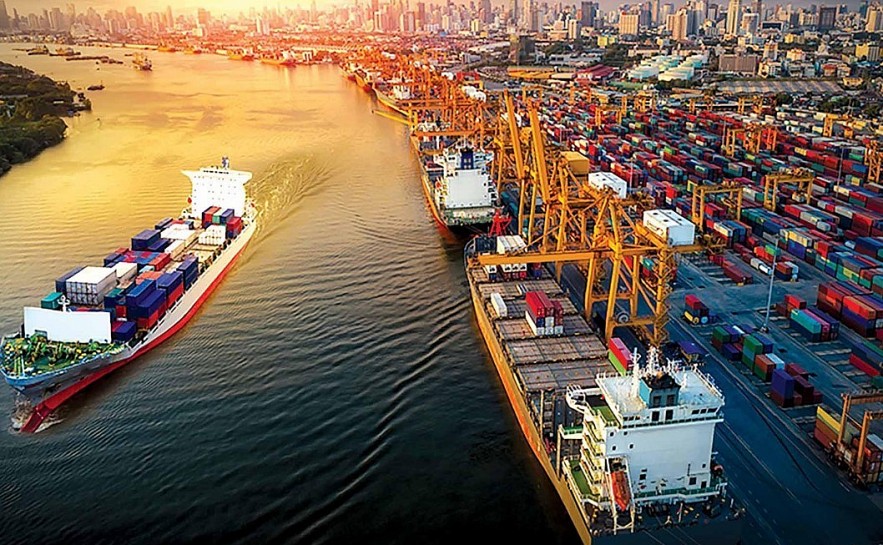 |
| Photo: doanhnghiepkinhtexanh |
Second, enhancing economic institutions and legal frameworks to strengthen economic security in the new context.
Continuing to refine and synchronize economic institutions and legal frameworks is essential to bolster the political and legal foundations for ensuring national economic security.
Economic development remains the Party’s central mission. The Party's guidelines, policies, and strategies for economic development are integral to the entire process of building and advancing the economy, serving as the foundation for ensuring national economic security. The 13th Party Congress emphasized the need to create a legal framework and favorable environment to foster development, entrepreneurship, innovation, digital transformation, and the digital economy. It highlighted the importance of supporting and encouraging the emergence and operation of new industries and business models. Efforts should focus on revising conflicting and overlapping regulations that hinder economic progress, streamlining administrative procedures, decentralizing, and delegating authority, while reinforcing discipline, accountability, and inter-agency coordination. Social organizations and professional associations should play a greater role in shaping and regulating market relations. Addressing market mechanism shortcomings, ensuring social welfare, environmental protection, and national security remain top priorities.
Efforts should also concentrate on optimizing the efficiency of inter-agency coordination and the formulation and implementation of administrative decisions. Building a modern public administration system that is democratic, lawful, professional, transparent, strong, and focused on serving the people is critical. Enhancing decentralization and delegation of powers requires clearly defining responsibilities among agencies, ministries, and levels of government, as well as between central and local authorities. This will eliminate overlapping functions, responsibilities, and powers, ensuring unified state management while fostering proactive, innovative, and responsible actions at all levels and sectors.
These measures aim to ensure the scientific operation of the economy, respecting market principles while fully utilizing the state’s regulatory role. They safeguard the socialist orientation of Vietnam's market economy, minimizing risks that threaten economic security and providing a robust foundation for sustainable national development.
Third, advancing economic theory to provide a solid scientific basis for national economic security.
Promoting research and refining theoretical frameworks for economic development is essential to establish a robust scientific foundation for ensuring national economic security in the new context.
It is necessary to draw on practical experience and enhance the theoretical system of building and developing a socialist-oriented market economy. This will provide a scientific basis for formulating economic development strategies and policies while ensuring economic security. Such efforts will improve the effectiveness of state economic management, enabling the timely detection and prevention of legal violations and activities that threaten economic and national security amid deeper international integration.
Research and creative application of Marxism-Leninism and Ho Chi Minh’s ideology on the Party’s centralized and unified leadership in economic development remain critical. These principles provide a strong foundation for ensuring economic security in the new era, consistently liberating and advancing social productive forces while enhancing national comprehensive strength. By advancing economic theory and aligning it with practical realities, Vietnam can build a more secure and resilient economic framework to navigate contemporary challenges.
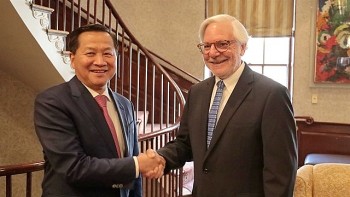 | Vietnam-US Cooperation Opens Up New Opportunities for Education and Training Secretary of the Viet Nam Communist Party's Central Committee, Deputy Prime Minister Le Minh Khai led the Vietnamese delegation to attend the 2024 Vietnam Executive ... |
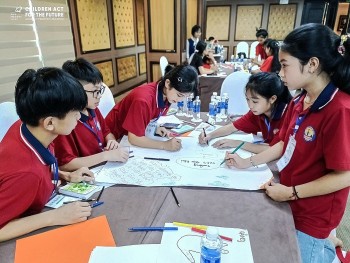 | GNI Develops Leadership Skills for Students in Hoa Binh and Tuyen Quang Leadership skills is one of the most important skills that can be acquired by the students in school days. |
Recommended
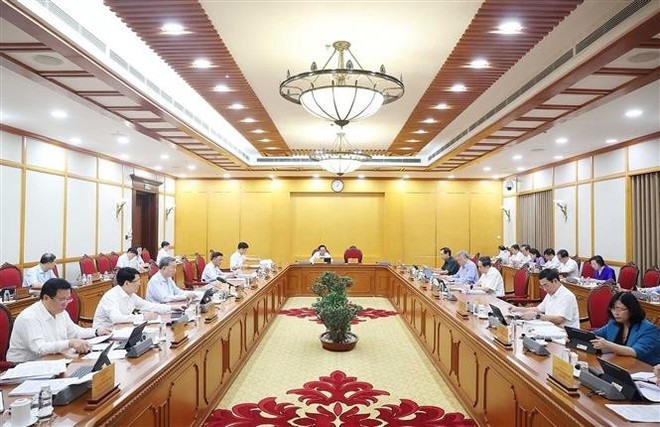 National
National
Vietnam News Today (Jun. 7): Prime Minister works with Estonian firms to accelerate projects in Vietnam
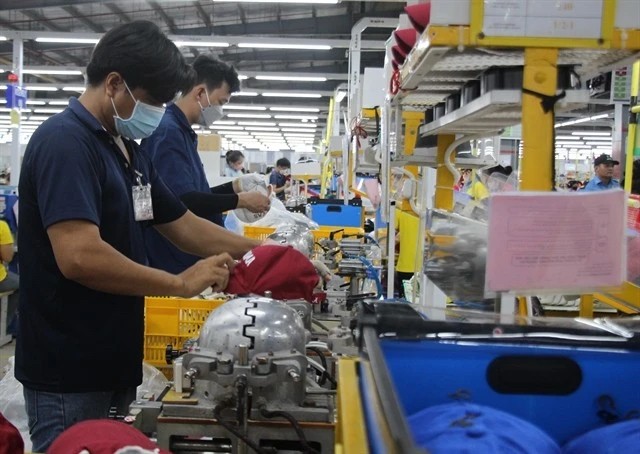 National
National
Vietnam News Today (Jun. 6): Foreign Investment in Vietnam Surges in Five Months
 National
National
Vietnam News Today (Jun. 5): PM sets off for attendance at UNOC 3 in France, official visits to Estonia, Sweden
 National
National
Vietnam News Today (Jun. 4): Vietnam - Promising Candidate for Southeast Asia’s Next Powerhouse
Popular article
 National
National
Shangri-La Dialogue 22: Vietnam Highlights Some Issues of Ensuring Stability in a Competitive World
 National
National
Vietnam News Today (Jun. 3): PM Pham Minh Chinh to Attend UN Ocean Conference, Visit Estonia, Sweden
 National
National
Vietnam News Today (Jun. 2): Vietnamese Trade Mission Sounds Out Business Opportunities in United States
 National
National




